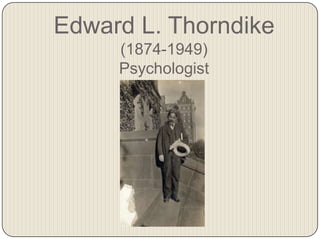
Edward l thorndike
- 1. Edward L. Thorndike (1874-1949)Psychologist
- 2. Edward L. Thorndike is widely known for his contributions to the study of Psychology. Referred to as “America’s most productive psychologist” and the “father of modern day educational psychology,” he published roughly 500 books and articles. “Amongst the minds of animals that of man leads, not as a demigod from another planet, but as a king from the same race.”~Edward Thorndike
- 3. Edward L. Thorndike Born August 31, 1874 in Williamsburg, Massachusetts to a Methodist Minister Developed an interest in Psychology after reading The Principles of Psychology by William James Graduated with a Bachelor of Science from Wesleyan University in 1895 Graduated from Harvard University with his Masters Degree in 1897 Earned PHD in 1898 from Columbia University after studying under psychologist James McKeenCattell August 29, 1900 Thorndike married Elizabeth Moulton—they would later go on to have five children.
- 4. In 1889 Thorndike left his position of Associate Professor at the College for Women of Case Western Reserve in Cleveland, Ohio after only one year of employment. He then took a position as a psychology professor at the Teachers College at Columbia University where he would stay for the rest of his career studying human learning, education, and mental testing.
- 5. Edward L. Thorndike 1911 Thorndike published “Animal Intelligence” In 1912 he was elected President of the American Psychology Association Thorndike was one of the first psychologists admitted to the National Academy of Sciences in 1917 1921 he became ranked #1 as an American Men of Science In 1934 Thorndike became elected President of the American Association for the Advancement of Science
- 6. Edward L. Thorndike In 1905 he formalized the Law of Effect which states: “Responses that are immediately followed by a satisfactory outcome become more strongly associated with the situation and are therefore more likely to occur again in the future. Conversely, responses followed by negative outcomes become more weakly associated and less likely to reoccur in the future.” The Law of Effect was the result of his extensive study with animals. Thorndike created devices called “puzzle boxes”. The experiments were based on animals being placed into these contraptions and could only escape from it by making some specific responses. If the animal is rewarded, by escaping, the behavior is learned.
- 7. Edward L. Thorndike 1917-1918 Thorndike served on the Committee on Classification of Personnel for the United States Army which created both the Alpha and Beta tests (ancestors to today’s ASVAB--a multiple choice test administered by the United States Military Entrance Processing Command to determine qualifications for enlistment in the United States armed forces.) used during World War I as the first mass testing of intelligence Soldiers were administered the Alpha test for classification purposes The Beta test, consisting of pictures and diagrams, was administered to soldiers unable to read
- 8. Edward L. Thorndike The terms “intelligence quotient” (IQ) and “mental age” entered popular language after the development of the Alpha and Beta tests and ultimately stimulated mass testing in schools, colleges and industry. “Adult education programs were invigorated when Thorndike's investigations of adult learning in the 1920s showed that innate and individual factors and not age are the determinants for the amount and quality of achievement and the ability to continue learning.”
- 9. Edward L. Thorndike 1927 “The Measurement of Intelligence” by Thorndike was published Thorndike’s “The Fundamentals of Learning” was published in 1932 In 1935 “The Psychology of Wants, Interest, and Attitudes” was published 1939 Thorndike retired from the Teachers College at Columbia University 1940 “Human Nature and the Social Order” by Thorndike is published
- 10. Edward L. Thorndike Edward L. Thorndike, “the father of modern day educational psychology,” died August 9, 1949. His career and worked spanned over 55 years.
- 11. Edward L. ThorndikeReferences Cherry, K. Edward Thorndike Biography. About.com. Retrieved March 21, 2011, from http://psychology.about.com/od/profilesmz/p/edward-thorndike.htm. Edward L. Thorndike. In Encyclopedia.com. Retrieved March 21, 2011, from http://www.encyclopedia.com/topic/Edward_L._Thorndike.aspx. Edward L. Thorndike. In Human Intelligence. Retrieved March 21, 2011, from http://www.indiana.edu/~intell/ethorndike.shtml. Edward Thorndike. In Wikipedia. Retrieved March 21, 2011, from http://en.wikipedia.org/wiki/Edward_Thorndike.
